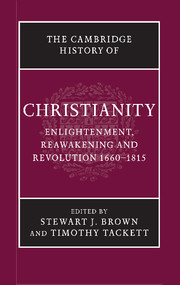Book contents
- Frontmatter
- Introduction
- PART I CHURCH, STATE, AND SOCIETY IN THE EUROPEAN WORLD, 1660–1780
- PART II CHRISTIAN LIFE IN THE EUROPEAN WORLD, 1660–1780
- PART III MOVEMENTS AND CHALLENGES
- PART IV CHRISTIAN DEVELOPMENTS IN THE NON-EUROPEAN WORLD
- 19 Christianity in Iberian America
- 20 British and French North America to 1765
- 21 Christianity in Africa
- 22 Christianity in south and south-east Asia
- 23 Christianity in East Asia
- 24 Christian encounters with other world religions
- PART V REVOLUTION AND THE CHRISTIAN WORLD
- Chronology
- Bibliography
- Index
- References
20 - British and French North America to 1765
from PART IV - CHRISTIAN DEVELOPMENTS IN THE NON-EUROPEAN WORLD
Published online by Cambridge University Press: 28 March 2008
- Frontmatter
- Introduction
- PART I CHURCH, STATE, AND SOCIETY IN THE EUROPEAN WORLD, 1660–1780
- PART II CHRISTIAN LIFE IN THE EUROPEAN WORLD, 1660–1780
- PART III MOVEMENTS AND CHALLENGES
- PART IV CHRISTIAN DEVELOPMENTS IN THE NON-EUROPEAN WORLD
- 19 Christianity in Iberian America
- 20 British and French North America to 1765
- 21 Christianity in Africa
- 22 Christianity in south and south-east Asia
- 23 Christianity in East Asia
- 24 Christian encounters with other world religions
- PART V REVOLUTION AND THE CHRISTIAN WORLD
- Chronology
- Bibliography
- Index
- References
Summary
The expansion of Christianity to North America long remained a thoroughly colonial affair. Not until after the Seven Years’ War (or French and Indian War) of 1754/56–1763 did the idea even begin to emerge that new-world colonies could be anything but extensions of their mother countries, for religious as for all other purposes. Huguenots, the party of Reformed Protestants in France, for instance, could play a role in the early settlement of Quebec and Acadia because a French monarch, Henri IV (ruled 1589–1610), who had once been a Protestant, had expanded their liberty with the Edict of Nantes in 1598. But after 1627, Cardinal Richelieu succeeded in banishing the Huguenots from New France as well as constricting their freedom at home. The very names of English colonies reflected a different kind of old-world presence. Virginia, for example, was named in honour of the Protestant Elizabeth who had ruled England as the virgin queen (1558–1603), and Maryland, after Henrietta Maria, the Catholic queen of Charles I (1625–49) and sister of the French monarch under whom Richelieu banished the Huguenots. Yet despite these intentions simply to replicate inherited patterns – intellectual, political, and social, as well as religious – new environments consistently forced the colonists to innovate.
From the old world, Catholics and Protestants both carried intense suspicion of the other. That antagonism, especially when exacerbated by competitive alliances with Native Americans, defined the wider horizons of formal religion for the entire period. Early on it was responsible for a rare bit of humour: on board ship to Acadia in 1604, a Catholic priest and a Huguenot minister had combated each other so vociferously that when they both died within the year, sailors of Samuel de Champlain buried them in the same grave that they might continue their arguments into eternity.
- Type
- Chapter
- Information
- The Cambridge History of Christianity , pp. 392 - 410Publisher: Cambridge University PressPrint publication year: 2006



